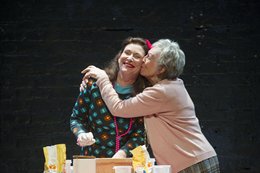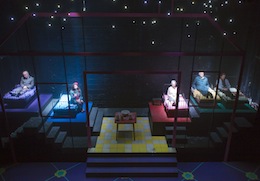“Put any two people in a room and they have a story to tell,” said writer Patrick McCabe in an interview given in advance of his most recent play, produced by Corcadorca theatre company and staged in the small, intimate space of the Half Moon Theatre in Cork. If this play is about anything, it is about the bounce and interplay, the shifts in pain and love and hate within the dynamics of personal relationships, particularly those of an intimate kind. Although audiences are likely more used to engaging with McCabe in cinema or in print, he has, in the past few years, moved towards theatre, and this stark, uncomplicated narrative has an understanding of the medium at its heart: it is the recognition and communion between audience and character that holds the energy of the piece over the hour and a half of its telling.
 It is, nonetheless, recognizably Pat McCabe. Bleak, black humour, tinged with a kind of surrealism, undercuts the work, energises it, and pushes it along. It doesn’t necessarily lighten the narrative – this is, after all, McCabe’s dark imagination – but it does save it from becoming utterly relentless, hopeless and despairing. McCabe is not afraid, however, of smacking an audience in the face – his characters, as ever, are exaggerated and instantly recognisable, repulsive and endearing, vulnerable and full of bravado.
It is, nonetheless, recognizably Pat McCabe. Bleak, black humour, tinged with a kind of surrealism, undercuts the work, energises it, and pushes it along. It doesn’t necessarily lighten the narrative – this is, after all, McCabe’s dark imagination – but it does save it from becoming utterly relentless, hopeless and despairing. McCabe is not afraid, however, of smacking an audience in the face – his characters, as ever, are exaggerated and instantly recognisable, repulsive and endearing, vulnerable and full of bravado.
Set in a kind of somewhere, nowhere, possibly in the middle of Ireland, McCabe brings together a motley crew of relatives and friends to celebrate the 80th birthday of family matriarch and carer Mammy Sweetheart. Sweetheart, played with elegant menace by Geraldine Plunkett, is the centrepoint of the family, around whom life revolves and who keeps her married 50-something son bound to her apron strings through subtle manipulation and power-play that is deeply resonant, if also deeply depressing. “I couldn’t leave my little Unkie (Ciaran McIntyre),” she says to her adult child, as she recounts the years of physical abuse she suffered at the hands of her husband – a “Radio Eireann star” – at once making her son both saviour and culprit. It’s enough, as it so often is, to engender unswerving loyalty and devotion on her son’s behalf, who cannot bring himself to openly acknowledge his hatred of his mother, instead transferring it onto his wife, Connie (Kate O’Toole), who is herself trapped in the triangular structure incorporating Unkie and her mother-in-law. Unable to stay, unable to go, Connie turns in on herself, trying to please the unpleasable matriarch, retreating into dreams of a past affair, when she felt herself alive and desirable.
This is not easy material, despite the humour. The characters are lonely and sad, even former showband member Hoagy (Donagh Deeney), who bounces in from Britain in his pointed winklepickers, announcing triumphantly that he is cured. “There’s no more depression,” he says, but his is a false front, masked by the effort he and his friends put into preparing and celebrating the party for Sweetheart. “Hold up that cake,” Connie asks her husband, desperate for any means of escaping the now. But there is no way out, and that includes the Monsignor (Brendan Conroy), once able to dominate a situation by telling his parishioners to “offer it up”, now plagued on all sides by taunts that he is a ‘paedo’.
Director Pat Kiernan keeps a tight reign on this potentially combustible material and never lets it slide out of control. The performances are measured, also controlled, the characters’ occasional verbal and even physical explosions – Unkie’s descent into anger and foul language; Connie’s uncomfortable demands for attention – emanating from a deep well of unresolved despair. Kiernan has gathered about him a sterling  ensemble cast and the acting is terrific to a performer, each actor stamping out a personal presence on the stage, while never pushing forward to dominate the proceedings. It is a real, and rare, pleasure to see Kate O’Toole in an Irish theatrical setting, but Plunkett, Deeney, Conroy and McIntyre – each composed and fully-embedded in their art – are also a superb pleasure to watch.
ensemble cast and the acting is terrific to a performer, each actor stamping out a personal presence on the stage, while never pushing forward to dominate the proceedings. It is a real, and rare, pleasure to see Kate O’Toole in an Irish theatrical setting, but Plunkett, Deeney, Conroy and McIntyre – each composed and fully-embedded in their art – are also a superb pleasure to watch.
As the title suggests, the less than welcome sense of the characters suffering is clothed over, even suffocated, by cake and sweetness, something that is highlighted by set designer Aedín Cosgrove’s outline of a pink house with what look alarmingly akin to prison beds on the inside. If, however, the characters are trapped in cages created for them by their culture, and by their own fearfulness, they will eventually – as they do at the play’s end - take out the gaudy instruments and party their life away. After all, what else can they possibly do?
Rachel Andrews is an arts journalist and critic based in Cork.